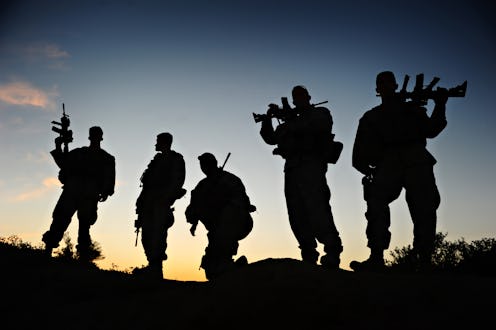News
One U.S. Soldier Dead In Afghanistan Shooting

A meeting in Afghanistan between a United States embassy official and a provincial governor went horribly wrong Wednesday when shooting broke out, reportedly leaving one American soldier dead and wounding two others. The meeting took place in the eastern city of Jalalabad and had already finished when an Afghan soldier turned his weapon on NATO troops. The International Business Times reports that Afghan insurgent group Hezb-i-Islami is claiming responsibility for the “insider attack,” although the motive remains unclear.
Some discrepancies appeared in the reporting of the incident. Afghan police confirmed that the NATO troops involved were American, and on their way to return to their station in Camp Gamberi when they were assaulted. NATO's statement, meanwhile, acknowledged that one soldier was killed but did not mention which country the man was from. A U.S. source told Reuters that the dead soldier, and two who were wounded, were American. Police reported that two Afghan soldiers were also wounded in the incident.
Although the police said it was not clear who had fired first, they claimed that an Afghan soldier had been taken in for questioning. According to The Guardian, an eyewitness and official reported that an Afghan soldier had opened fire on the American troops before he himself was killed. Another witness — this one an Afghan interpreter — denied that U.S. soldiers had died, saying that four Americans had been injured but the only casualty was the Afghan assailant. “We killed him straight away,” the witness is quoted as saying by Mashable.
General Fazel Ahmad Sherzad, police chief for eastern Nangarhar province, said the fighting only began after the meeting had ended. “Right after the US official had left, suddenly an Afghan army soldier opened fire on the US soldiers who were present in the compound,” he said. The U.S. troops then opened fire and killed their attacker, said the police chief. Sherzad named the Afghan soldier as Abdul Azim from Laghman province.
The U.S. embassy in Kabul swiftly tweeted a statement, but did not mention any casualties. Their successive tweets read:
We are aware that there was an exchange of gunfire involving @ResoluteSupport service members near the provincial governor's compound … in Jalalabad. The incident took place after a senior U.S. official held a meeting with the provincial governor … All Chief of Mission personnel of the visiting party are accounted for.
The incident is the second “insider attack” to take place in Afghanistan this year. On Jan. 29, an Afghan soldier killed three U.S. security contractors in Kabul before he was gunned down. Reuters reports that such attacks have grown less common since most foreign troops withdrew from the country in 2014. Around 12,000 NATO troops are still in the country — less than 10,000 of those are American. Their stay has been extended in order to train Afghan forces.
According to Reuters, in the last years of the war many incidents occurred to ramp up tensions between the Afghan troops and their international allies. The coalition reacted by scaling back interaction between their men and the Afghan forces. The Taliban have reportedly claimed such violent insider attacks as evidence of their infiltration into the armed forces, but the soldier themselves maintain that such incidents are generally motivated by misunderstandings or disputes.
In the most recent incident, no motive has so far been set forth. According to information reported by Pajhwok Afghan News Agency (and relayed by the International Business Times) the militant group Hezb-i-Islami claimed responsibility for the attack on Wednesday. The Islamic extremist group is allied to the Taliban and has previously said it would consider linking up with ISIS, provided the latter “meet the requirements for an Islamic caliphate.”
Spokesman Zubair Sediqi told Pajhwok Afghan News that the group had arranged Wednesday’s assault on NATO troops. But this claim, as yet unsubstantiated by evidence (of, say, Azim's link to Hezb-i-Islami), seems somewhat flimsy — akin to the Taliban’s opportunistic boasting on the back of previous insider attacks.
Images: ResoluteSupportMedia/Flickr (2)